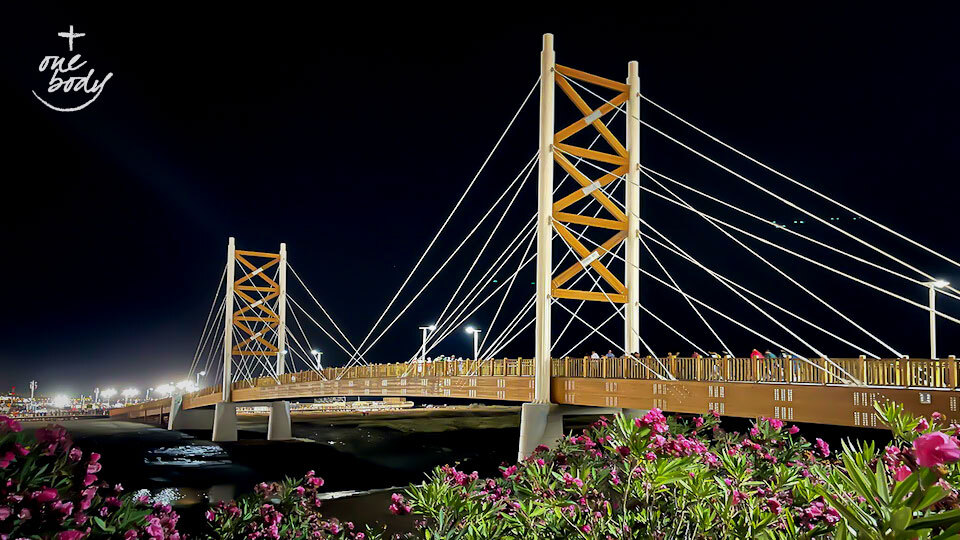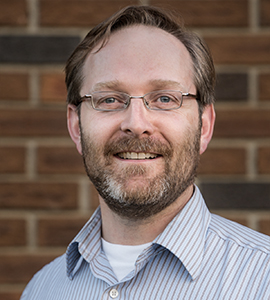



"Next Gen" Ecumenism | One Body
Julien Hammond
Thursday, September 14, 2023

The new Cycle-Pedestrian bridge over Lisbon's River Trancão during World Youth Day 2023. The permanent bridge was built near Parque Trejo, where most major WYD events were held, as part of preparations for the gathering.

"Next Gen" Ecumenism
by Julien Hammond
The recently concluded World Youth Day in Portugal (August 1-6, 2023) included a number of ecumenical and interreligious experiences, opportunities, and lessons that garnered praise and criticism in Catholic and non-Catholic circles alike.- In addition to visiting and participating in events held within Catholic venues, WYD pilgrims were invited to visit significant Protestant and Orthodox churches and other houses of worship (synagogues, mosques, temples) in Lisbon and throughout the country, to “observe” how each religious denomination has its own history, content, ritual, and societal outreach.
- With fellow Christians, WYD pilgrims were invited also to participate in prayers, lectures, and bible studies offered by Anglican, Protestant, Orthodox Church leaders, and ecumenical communities (such as Taizé and Chemin Neuf), and to “look for signs of unity” (of faith, sacrament, and mission) between these Christian communities.
- On the interfaith side, organizers highlighted that “leaders of other faiths will be present at various events of the WYD Lisbon 2023 presided over by the Pope,” and indeed Pope Francis met with a number of ecumenical and interreligious leaders at significant events held throughout the week.
- Groups from various religious backgrounds participated in a Youth Festival program that featured “music and singing as a universal language that facilitates encounters between religions, cultures and peoples.”
The Value of Dialogue
Pulling back from the debate about what should or should not happen at a global gathering of Catholic youth, the perspectives espoused above speak to some profound ecclesial realities, such as mission, evangelization, and vocation. As well, they speak to the value that we give to ecumenical and interreligious dialogue, and to relationships generally, within the religious formation of youth and young adults, Catholic or otherwise. To paraphrase a couple of superb questions posed in the CCCB’s 2011 resource, On Good Soil: Pastoral Planning for Evangelization and Catechesis with Adults (cf. p.164):- What should be the Church’s attitude toward ecumenical and interreligious realities, as it prepares children, youth, and young adults to live in contact with brothers and sisters of other confessions?
- How can we guide young people to a respectful stance that still seeks to model and proclaim the wonder of Christ, present in our world and in our midst?
Each new generation of young Christians inherits the burden of past divisions. Their human and spiritual education is often marked, consciously or unconsciously, by prejudices and misunderstandings of divided Christian communities. It is confusing to hear the one message of the Gospel through many conflicting voices. Therefore, it is of paramount importance that young Christians be given the opportunity to make friends with Christians of other traditions, to read the Gospel and to pray with them, to grow in understanding and appreciation of their particular gifts. However humble and small-scale these shared experiences may be, they are genuine steps toward greater unity among Christians (#52).This year’s WYD pilgrims have returned from Lisbon with many rich, new insights. I hope they will be given opportunities to share with their home parishes and dioceses all the many things they may have learned and experienced through ecumenical, interreligious, and intercultural encounters that took place there. I hope they will be able to tell us in their own words the impact of those encounters as moments of clarity, questioning, or growth in their Catholic Christian identity. I hope their experiences and testimonies will encourage a future generation of ecumenists and interreligious specialists to develop new friendships with members of other faith communities and to explore new directions in dialogue, all in the name of human fraternity. Indeed, the Church has much to gain and to learn from her “next gen” ecumenists.
 Julien Hammond has been the ecumenical officer for the Catholic Archdiocese of Edmonton for over twenty years. He has served as a member of the Roman Catholic-United Church of Canada Dialogue, the Anglican-Roman Catholic Dialogue in Canada, and the Christian Church (Disciples of Christ)-Roman Catholic International Consultation. He is currently a member of the Jewish-Catholic national dialogue, co-sponsored by the Canadian Rabbinic Caucus and the Canadian Conference of Catholic Bishops.
Julien Hammond has been the ecumenical officer for the Catholic Archdiocese of Edmonton for over twenty years. He has served as a member of the Roman Catholic-United Church of Canada Dialogue, the Anglican-Roman Catholic Dialogue in Canada, and the Christian Church (Disciples of Christ)-Roman Catholic International Consultation. He is currently a member of the Jewish-Catholic national dialogue, co-sponsored by the Canadian Rabbinic Caucus and the Canadian Conference of Catholic Bishops.

Related Articles:
<<
SUPPORT LABEL
$50
$100
$150
$250
OTHER AMOUNT
DONATE
Receive our newsletters
Stay Connected
Receive our newsletters

Stay Connected







